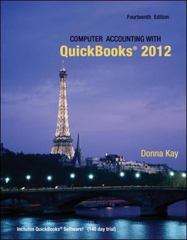Question
All true/false questions 1.When a material subsequent event requires only financial statement disclosure, the auditor may choose to date the entire auditor's report as of
All true/false questions
1.When a material subsequent event requires only financial statement disclosure, the auditor may choose to date the entire auditor's report as of the later date at which that disclosure was evaluated.
2. If a predecessor auditor is considering reissuing a previously issued auditor's report, the predecessor should read the financial statements of the subsequent period for comparison to the previously audited financial statements to identify any significant changes.
3. When reissuing an audit report on financial statements that require disclosure, but not adjustment, for a material subsequent event, the reissued audit report may use the original report date if the entity under audit includes a separate footnote to the financial statements labeled something like "Event (Unaudited) Subsequent to the Date of the Independent Auditor's Report."
4. When the entity's financial statements are properly adjusted after completion of fieldwork for a material subsequent event without providing any additional disclosure about the event, the auditor's report must be "dual dated" with respect to the subsequent event.
5. When adjustment is required to financial statements previously reported on due to a subsequent event, the financial statements intended for reissuance should include both adjustment and footnote disclosure regarding that event.
6. Suppose that subsequent to the issuance of the audit report, the auditor discovers that a procedure considered necessary under the circumstances was omitted. The auditor should perform the omitted procedure and, if the results are consistent with the opinion expressed, document the procedure in the working papers.
7. Material subsequent events that do not relate to circumstances already in effect as of the entity's balance sheet date would require disclosure in the financial statements, but not adjustment of the financial statements.
8 Material subsequent events require adjustment of the financial statements as of the entity's balance sheet date.
9. Subsequent events are limited to events occurring after the entity's balance sheet date through the end of fieldwork.
10. When an auditor dates the entire auditor's report as of the date at which the disclosure of a subsequent event was evaluated, the auditor is responsible for considering the financial statement effects of all subsequent events up to that date.
11. If an auditor has decided to use the original report date when reissuing an audit report, the auditor is still responsible for reviewing the entity's records, transactions, and events after that original report date.
12. When a subsequent event involves additional footnote disclosure in the financial statements, the auditor's report may either be dual dated or use a single later date applicable to when the subsequent event was addressed.
13. Suppose that subsequent to the issuance of the audit report, the auditor discovers that a procedure considered necessary under the circumstances was omitted, and that when the procedure was then performed, the results were in conflict with the unqualified opinion previously expressed. The auditor should initially request the client's assistance in recovering the erroneous reports before contacting financial statement users or regulators.
14. If a predecessor auditor is considering reissuing a previously issued auditor's report, the predecessor should obtain written representations from management about matters relevant to previous representations from management. The predecessor should also obtain a representation letter from the successor auditor about known matters affecting the financial statements audited by the predecessor.
15. Suppose that subsequent to the issuance of the audit report, the auditor discovers that a procedure considered necessary under the circumstances was omitted, and that when the procedure was then performed, the results were in conflict with the unqualified opinion previously expressed. The auditor should immediately inform all known financial statement users that the report was erroneous and should not be relied on.
Step by Step Solution
There are 3 Steps involved in it
Step: 1

Get Instant Access to Expert-Tailored Solutions
See step-by-step solutions with expert insights and AI powered tools for academic success
Step: 2

Step: 3

Ace Your Homework with AI
Get the answers you need in no time with our AI-driven, step-by-step assistance
Get Started


